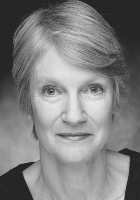Rachel Hadas
Rachel Hadas Poems
A Greek I worked for once would always say
that tragedies which still appall and thrill
...
Sweet smell of phlox drifting across the lawn—
an early warning of the end of summer.
...
So far the nights feel lonelier than the days.
In light, the living keep me company,
...
Sing now the heavy furniture of the fall,
the journey's ending. Strong Aeneas bears
...
Impressionist painters capture sun
sparkling over waves as slots and bars
...
Doomed beauties, my companions, my familiars,
your long arms braceleted with snakes of danger,
...
Rachel Hadas Biography
Rachel Hadas (born November 8, 1948) is an American poet, teacher, essayist, and translator. Her most recent essay collection is Classics: Essays (Textos Books, 2007), and her most recent poetry collection is The Ache of Appetite (Copper Beech Press, 2010).Her honors include a Guggenheim Fellowship, Ingram Merrill Foundation Grants,the O.B. Hardison Award from the Folger Shakespeare Library, and an Award in Literature from the American Academy and Institute of Arts and Letters. The daughter of noted Columbia University classicist Moses Hadas and Latin teacher Elizabeth Chamberlayne Hadas, Hadas grew up in Morningside Heights, New York City. She received a baccalaureate at Radcliffe College in classics, a Master of Arts (1977) at Johns Hopkins University in poetry, and a doctorate at Princeton University in comparative literature (1982). Marrying a man from the island of Samos and living in Greece after her undergraduate work at Radcliffe, Hadas became an intimate of poets James Merrill and Alan Ansen, both of whom strongly influenced her early work, as did Cavafy, whose work she translated, and Seferis. She is often associated with the New Formalism school of poetry, and her work was included in landmark collections of New Formalism including Rebel Angels and A Formal Feeling Comes. Her subject matter ranges from her roots in the classics through the intimately personal, with memory a recurring theme throughout her work. During the height of the AIDS crisis, she led poetry workshops for those afflicted, and edited a number of their works with Charles Barber, experiences that informed her subsequent work. Her translations of writers including Tibullus, Baudelaire, and the Greek poet Konstantine Karyotakis, have been published to much acclaim. She has taught English at the Newark campus of Rutgers University since 1981, where, as of 2006, she is the Board of Governors Professor of English. She was married to composer George Edwards until his death in 2011, and lives with their son in Manhattan.)
The Best Poem Of Rachel Hadas
The Chorus
A Greek I worked for once would always say
that tragedies which still appall and thrill
happen daily on a village scale.
Except that he put it the other way:
dark doings in the sleepiest small town
loom dire and histrionic as a play.
Cosmic? Perhaps. Unprecedented? Not
to the old women sitting in the sun,
the old men planted in cafes till noon
or midnight taking in the human scene,
connoisseurs of past-passing-and-to-come.
These watchers locate in their repertory
mythic fragments of some kindred story
and draw them dripping out of memory's well.
Incest and adultery; exile
and murder; divine punishment; disgrace:
the trick is to locate the right-sized piece
of the vast puzzle-patterned tapestry
from which one ripped-out patch makes tragedy.
This highly skilled and patient process—find
a larger context, match and patch and mend—
is what the chorus in Greek tragedy
has always done. And to this very day
spectators comb the tangles of a tale,
compare, remember, comment—not ideal,
but middle-aged or older, and alert.
Beyond the hero's rashness or the hurt
heart of the heroine, they've reached the age
when only stars still lust for center stage.
The chorus, at a point midway between
the limelight and the audience, is seen
and unseen. Lady chaperones at balls
once sat on brittle chairs against the walls.
"My dancing days are over," they'd both sigh
and smile. Or take the case of poetry.
Mine used to play the heroine—me me me—
but lately, having had its fill of "I,"
tries to discern, despite its vision's flaws,
a shape. A piece of myth. A pattern. Laws.
